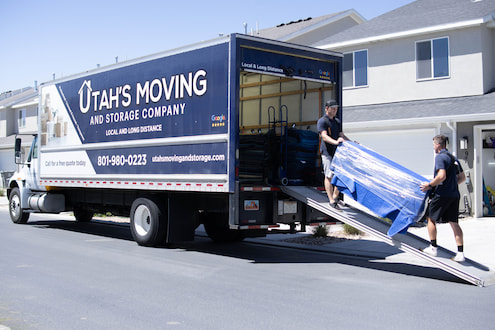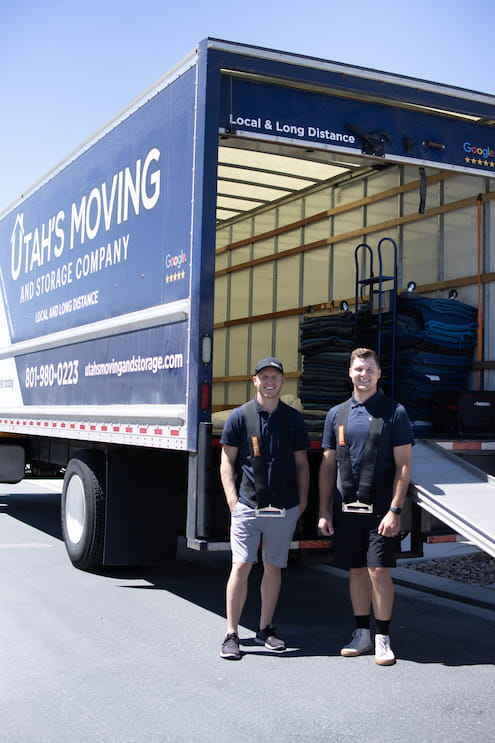Moving Week Checklist from a Professional Moving Company
The countdown echoes ominously in your brain like the disembodied voice from a NASA control tower: seven… six… five…. You have seven days until the truck lands at your doorstep and your sanity departs. At least, that’s how it feels if you are entering the last week of move arrangements under-prepared.
Yes, there’s much to do, but this is not an impossible goal. You aren’t trying to get a space vehicle to Mars; you just want to get yourself and your belongings to your new, earthbound home. You don’t need to be a rocket scientist to figure out how to manage a move, but you need to be on top of your to-do list, especially as you enter the final countdown.

Here’s our list of things you need to accomplish in the week before you take off for your new location:

Secure Parking
If you still need to do so, secure parking permits for your moving truck. Your city and HOA or building management company may require a license for large vehicles. Additionally, these permits will often reserve a specific space for your moving vehicle. Applying for the permit may allow you to secure the parking area directly in front of your home. The city may come out and post no-parking signs, or they may provide them to you to display.
Imagine the sinking feeling in your stomach when your truck arrives on move day, and you realize the nearest available parking space large enough for the vehicle is three blocks over. That’s not a great way to start your move. Avoid that stress by reserving a space. If your city or complex has no method for doing so, park your cars in the necessary space to claim it until the truck arrives.
Reserve Elevators
If you live in an apartment, be advised that many buildings require elevator reservations for a move. Building management may then put up pads to protect the elevator and post a note that it is out-of-service for regular use. You may have to pay a fee for this reservation.
No later than the week of your move, reach out to your complex to secure the use of the elevator and find out about any requirements. Sometimes, the building manager will direct you to use a specific elevator or the freight elevator, which may not be the one closest to your home.


Notify Neighbors
You will have a large truck parked in front of your home for a day or more. Workers from the residential moving company will come and go all day or perhaps for several days. As a courtesy, notify your surrounding neighbors about your upcoming move. That way, they’ll know that the strangers walking out of your house with your TV are no cause for concern. You can also ask for their help with reserving parking if there’s no formal process for doing so.
Giving your neighbors a heads-up is an excellent courtesy. It will likely make them more tolerant of any disruption caused by your move.
Confirm Your Movers
Whether you work with local teams or out-of-state moving companies, you should check in with them about a week before your move. Confirm arrival timelines and ensure they have all the correct details about your move. Remind them where they need to park. Check to be sure they are aware of any unusual items you have, whether that’s a grand piano in your living room or an oversized table in your company’s boardroom.
Hopefully, you did more research into choosing your moving company than just googling “commercial movers near me” or finding residential movers based on a truck you saw in the neighborhood. You have nothing to worry about if you’ve chosen your moving company carefully and vetted them for experience, reliability, and expertise. One final call to them during your move week allows you to ask any last questions and confirm arrival times and other details.
If you are renting your own moving truck, now is the time to confirm that reservation. Few things inject more stress into a move than showing up on the morning of your move to pick up a truck, only to find no trucks available. That’s a level of panic no one should ever feel.
Unfortunately, a reservation doesn’t always guarantee you will avoid this problem. It’s not unheard of for someone to show up at one of the national truck rental companies only to find that they don’t have a vehicle available, even with a reservation. If you want to avoid this problem, consider working with a moving company that owns its own fleet of vehicles.


Finalize Packing and Organizing
If you are doing some or all of the packing yourself, you should have been working on it for months or at least weeks. That means most of the packing should be completed if it is a DIY undertaking.
During your final days in your home or office, pack the items you needed available until the last minute. That minute has arrived, so wrap the last mug in packing paper, tape up those final boxes, stick on your last inventory label, and get ready to move.
You may have chosen to have professionals pack your things. That will ensure they are packed with enough care and padding to survive their journey intact. In that case, your final week will be considerably less hectic. These last days are the time to do any final organizing to help make your unpacking process as easy as possible. Group similar things together. For example, put all your wall art in one room so it is packed together, or consolidate all your pet supplies if you store them in several areas around your home.
Whether your move from Salt Lake City will be loaded by employees from a Utah moving company or by friends you lured in with promises of pizza and soda, someone might accidentally grab an item you don’t want to move (like the suitcase of clothing you’ll need to get you through the next few days). To keep this from happening, group all of your “don’t move” items together. Then, move them to an area that your movers won’t even enter. That might mean putting them in a spare bathroom (and marking it with a “don’t disturb” sign) or even moving things to your car.
Do you have a vacuum cleaner borrowed from a friend? Lawn equipment that belongs to your landlord? A ladder or chair you promised to give to a neighbor? Try to get these items out of the house before move day. If you can’t get them to the right people in time, set them aside, clearly label them, and let your team know before the work begins that those items are off-limits.
Make Arrangements for Pets
Picture your move from your dog or cat’s perspective. A bunch of strangers are invading your home and walking off with your possessions. Some human just carried away your very favorite bed and the bin of your precious stuffed toys. Austin Meowers and Indiana Bones aren’t thinking, “These people are trusted professionals helping my family move.” They’re probably thinking, “Alert, alert, alert!”
Additionally, workers constantly open doors, leaving them agape while maneuvering with bulky items. It would be easy for your furry or scaled friend to slip out unnoticed. If pets feel stressed and disrupted, their instinct may be to flee. You don’t want to spend the rest of your move-day desperately searching the neighborhood for your four-legged friend.
Arrange for your pets to stay at daycare, a daily boarding facility, or with a friend during the move. Since you can’t explain what’s happening to your animal family members, you can’t alleviate their stress and calm their nerves. Removing them from what will be a confusing, alarming process is a kindness.
If you can’t have them out of the house for move-day, set up a secure, quiet area for them. That will ensure they have a space to escape the chaos and can’t slip out of an opened door. It will also be safer for them. A cat weaving through the legs of your long-distance movers as they try to carry your washing machine down the stairs is not the best situation for the cat, the movers, or the washer. For everyone’s safety and comfort, make a plan to contain your pets.


Take Care of Your Home
If you live in a rented home, check your lease for any specific requirements for moving out. Many landlords or property managers require carpet cleaning or pest treatment. Move week is the time to arrange these services. It will be easier for the carpet cleaning company to navigate your home when empty, so you can schedule this service for the day after your local or long-distance movers are expected to finish their work. However, you should still make the appointment now to ensure the service providers are available on your required dates.
Your lease or the terms of your home sale may also require you to paint or patch nail holes in your wall. Get this done early in your move week so it’s one less thing to worry about.
Arrange for your landlord or property manager to do an informal home inspection shortly before you leave. While it may not be comprehensive, you will have time to work on solutions if they notice any issues you need to address. If you wait until the final day of your lease, you may receive a hefty damage fee for something you could have easily fixed on your own.
Pack your Essentials
Moving will disrupt your life for quite a while. It takes time to unpack every box and unwrap every glass. That’s why you should set aside the items you’ll need to live over the next several days while your life is in flux.
Pack everything you’ll need for a week. Think through all your activities and the plans of your family members. If your new workplace is having a cocktail party to introduce you to the team, you’ll need your suit or dress. If your kids will attend a final soccer game after you’ve moved out and are staying in a hotel, pack their cleats and uniforms.
Include all medications and toiletries you’ll need for at least a week or longer if you will be in transit for more than a few days. This will give you time to unpack without having to make a drugstore run or find a pharmacy at your new location. If the stress of driving a massive moving truck across the country gives you indigestion, you’ll appreciate having an antacid with you. That may not help with the damage costs from backing into a pole you couldn’t see, or the ticket you got for not pulling into a weigh station as required, but at least your gut will feel better.
Bring enough clothes for at least a week as well. You will be busy on move day and the first days in your new home. You don’t want to wake up on your third day in your new location, realize you are out of clean underwear, and worse yet, discover that you have no laundry detergent and your washing machine isn’t hooked up yet.
While packing necessary items, remember to set aside your car keys. You wouldn’t be the first person to make an expensive emergency trip to the car dealership to replace keys that have ended up in the bottom of a moving box hundreds of miles away. That’s not a promising way to start the next chapter of your life.
Put all of these essentials, your suitcases, and other do-not-pack possessions in their own area, clearly marked so everyone on your moving team knows not to touch them.


Gather House Keys and Other House-Related Items
Set aside a small box or bag in the above mentioned do-not-pack area. Use this to collect items you need to turn over to your landlord, property manager, or new owners. What a helpless feeling it is when the entire house is packed and loaded, and you realize your garage door openers are somewhere on the moving truck.
Collect garage door openers, house keys, pass cards, and other items to give back to the landlord or new occupants. Remember to include items like keys for the community pool or access cards for your office building.
Confirm Utility Cancellations and New Services
Hopefully, you’ve already arranged to shut off utilities at your current location and establish service connection for your new residence or office. If not, make those calls early in the move week, as these changes are not always immediate.
If you have made the arrangements, take time away from goodbye parties and suitcase packing to confirm appointments. Confirming with cable, internet, and utility companies will help prevent disruptions or delays in service and ensure you aren’t continuing to pay for a service after you’ve departed.


Clean
Your home or office needs to be in the appropriate condition for turning it over to the new owner or back to the landlord. Moving day will be hectic. Spend time cleaning your spaces in the week leading up to relocation day. You don’t want to be furiously scrubbing the stove while the packers box your dishware or filling your bathroom with cleaning fumes as your friends haul boxes out of the adjacent bedroom. Do these tasks during move week and check them off the list.
Not all of the cleaning can be done in advance, but some can. You’ll likely need one bathroom to stay operational, but you can clean additional bathrooms (preferably the biggest ones since they’ll take longer) and mark them as “off limits.” You can clean the stove and refrigerator since you won’t likely be doing much cooking during move-out week. You can also clean blinds and windows and wipe out cabinets.
If you already have too much on your plate, most cleaning companies offer special move-out cleaning services. These are usually performed after move-day. Book ahead of time to ensure availability.
Get Cash
Many of us can’t remember the last time we paid cash for anything. However, for move week, you should have some cash on hand. Whether you use it for tipping the delivery driver who brings lunch while your boxes are being loaded or as a thank you to your moving crew, it’s nice to have money available if you need it.
Tipping the moving crew isn’t required, but if you feel they worked hard for you and treated your belongings well, tips are much appreciated. We know that tipping culture is confusing and anxiety-provoking. If you are looking for a benchmark, many people choose to tip 15-20% of the total cost of the move.


Secure Snacks
You’ve likely spent the last month trying to eat through your freezer and pantry supplies, so you have less to move or donate. If you don’t have much left, congratulations. However, you should do a small amount of resupplying. Whether doing the move work yourself, with friends, or using professional movers, having drinks and snacks on hand is good practice. Shop for these during move week so you are ready to fuel the hard work happening on moving day.
Workers from a Utah moving company toiling on a 100-degree day in Salt Lake City will appreciate cold drinks if you want to make them available. If your friends are hauling boxes through the cold and snow, the least you can do is offer them a hot cup of coffee or hot chocolate. Regardless of the weather, having bagels and cream cheese in the morning and sandwich fixings in the afternoon will help your friends know that they are appreciated.
Give Yourself Time
Filling your final week in your old home chock full of activities can be tempting. You want to see all your friends one last time. It’s your final opportunity to have the fantastic spaghetti and meatballs from your favorite hole-in-the-wall restaurant down the street. During this last week, the pull of these familiar, comfortable habits will be strong.
While you want to give yourself time to say farewell to all the people, places, and pasta you love, try leaving a few empty spots in your calendar. If your schedule is crammed full, you will be too busy to complete many of the crucial tasks on this list. Perhaps more importantly, you won’t have time to process your feelings. This may be an emotional week.
Enjoy one last cup of coffee at your kitchen table or an evening beverage while appreciating the view from your patio. Experiences like these can help you process the emotions of your move. Give yourself time to soak in some final moments in your home.
Whatever you can do in these final days to create peace of mind is a gift to yourself. That may mean making time to literally stop and smell the roses in the front yard. It may mean hiring professional movers to finish the packing that you thought would be completed by now but isn’t. Or it could be enjoying a final night out, appreciating local friendships that will soon be long-distance relationships. Think about the things you will miss most and prioritize them. And save a little time for catching your breath and letting the emotions of this significant transition wash over you.

Moving your Business?
Many of the same move-week tasks still apply if you move a business instead of a household. You will want to add time to focus on caring for your clients. The week of the move is a great time to send out one last reminder of your relocation, with contact information for your new site. Include dates and times your offices will be closed and, if relevant, an emergency contact number.
Relocation is a stressful process, no matter how many checklists you have or how well-executed your move. The moving week tasks we’ve discussed can help remove some of the stress.
The single most effective way to make your move week less chaotic and stressful is to work with professional movers. They will offer commercial or residential moving solutions to make the process more pleasant. You can get through this process with your treadmill properly disassembled and your sanity fully intact.
If you are wondering, “Should I reach out to residential movers near me?” the answer is always yes. Moving companies that offer a la carte services can tailor a move to meet your timelines, needs, and budget. With their help, while your move week will still be busy, it won’t be overwhelming.